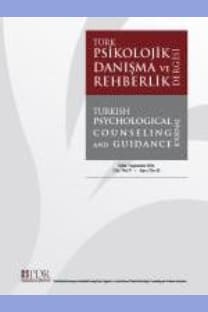Psikolojik danışma Öz-Yeterlik Ölçeği Türkçe Formu'nun geçerlik ve güvenirlik çalışması
___
- Bandura, A. (1986). Social foundations of thought and action. New York: Prentice Hall.
- Bandura, A. (1997). Self-efficacy: The exercise of control. NY: W. H. Freeman and Company.
- Beutler, L. E., Malik, M., Alimohammed, S., Harwood, M. T., Talebi, H., Noble, S., & Wong, E. (2004). Therapist variables. In, M.J. Lambert (Ed.) Bergin and Garfields handbook of psychotherapy and behavior change (5th ed., pp. 229-269). New York: Wiley.
- Can, G. (2010). Development of the Elementary School Counselor Self-efficacy Scale. Procedia-Social and Behavioral Sciences, 9, 1158-1161.
- Conte, H. R., Plutchik, R., Picard, S. & Karasu, T. B. (1991). Can personality traits predict psychotherapy outcome? Comprehensive Psychiatry, 32(1), 66-72.
- Cormier, S. & Nurious, P. S. (2003). Interviewing and change strategies for helpers: Fundamental skills and cognitive behavioral interventions. (5th ed.). Pacific Grove: Thomson-Brooks/Cole.
- Eriksen, K. P. & McAuliffe, G. J. (2006). Constructive development and counselor competence. Counselor Education and Supervision, 45, 180-192.
- Erkan, Z. (2011). Okul psikolojik danışmanı öz-yeterliğini yordamada eğitim yaşantılarına ilişkin memnuniyetin rolü. Yayınlanmamış Yüksek Lisans Tezi, Uludağ Üniversitesi, Sosyal Bilimler Enstitüsü, Bursa.
- Gençdoğan, B. & Özpolat, A. G. (2007). Psikolojik danışma becerilerini ölçmek için Danışman Beceri Ölçeği. IX. Ulusal Psikolojik Danışma ve Rehberlik Kongresi, 17- 19 Ekim, İzmir.
- Hackney, H. & Cormier, S. (2005). The professional counselor: A process guide to helping. (5th edition). Boston: Pearson.
- Hanson, M. G. (2006). Counselor self-efficacy: Supervision contributions, impact on performance, and mediation of the relationship between supervision and performance. Unpublished doctoral dissertation, Southern Illinois University.
- Iannelli, R. J. (2000). A structural equation modeling examination of the relationship between counseling self-efficacy, counseling outcome expectations, and counselor performance. Unpublished doctoral dissertation, University of Missouri-Kansas City.
- Johnson, M. E. (1985). The relative effects of self- observation versus self-modeling on counselor trainees anxiety, recall, self-evaluations, self- efficacy expectations and counseling performance. Unpublished doctoral dissertation, University of California, Santa Barbara.
- Johnson, E., Baker, S. B., Kopala, M., Kiselica, M. S. & Thompson, E. C. (1989). Counseling self-efficacy and counseling competence in prepracticum training. Counselor Education and Supervision, 28, 205-218.
- Kocarek, C. H. (2001). Understanding the relationships among counseling self-efficacy, anxiety, developmental level, coursework, experience, and counselor performance. Unpublished doctoral dissertation, Western Michigan University, Kalamazoo, Michigan.
- Larson, L. M. (1998). The social cognitive model of counselor training. The Counseling Psychologist, 26(2), 219-273.
- Larson, L. M. & Daniels, J. A. (1998). Review of the counseling self-efficacy literature. The Counseling Psychologist, 26(2), 179-218.
- Larson, L. M., Suzuki, L. A., Gillespie, K. N., Potenza, M. T., Bechtel, M. A. & Toulouse, A. L. (1992). Development and validation of the Counseling Self- estimate Inventory. Journal of Counseling Psychology, 39(1), 105-120.
- Lent, R. W., Hill, C. E. & Hoffman, M. A. (2003). Development and validation of the Counselor Activity Self-efficacy Scales. Journal of Counseling Psychology, 50, 97-108.
- Lambert, M. J. & Ogles, B. M. (2004). The effi cacy and effectiveness of psychotherapy. In, M.J. Lambert (Ed.) Bergin and Garfields handbook of psychotherapy and behavior change (5th ed., pp. 139-193). New York: Wiley.
- Schermeller-Engel, K., Moosbrugger, H. & Müller, H. (2003). Evaluating the fit of structural equation models: Test of significance and descriptive goodness-ofmeasures. Methods of Psychological Research, 8, 23-74.
- Sharpley, C. F. & Ridgway, I. R. (1993).An evaluation of the effectiveness of self-efficacy as a predictor of trainees counseling skills performance. British Journal of Guidance and Counselling, 21, 73-81.
- Yiyit, F. (2001). Okul psikolojik danışmanlarının yetkinlik beklentilerini ölçmeye yönelik bir ölçek geliştirme çalışması. Yayınlanmamış Yüksek Lisans Tezi, Çukurova Üniversitesi, Sosyal Bilimler Enstitüsü, Adana.
- ISSN: 1302-1370
- Başlangıç: 1990
- Yayıncı: -
Sayıdaki Diğer Makaleler
Fedakarlıkta algılanan zarar ölçeği ve fedakarlık doyum ölçeği'nin Türkçe'ye adaptasyonu
Otantiklik ölçeğinin türkçe'ye uyarlanması: Geçerlik ve güvenirlik çalışması
Psikolojik danışma Öz-Yeterlik Ölçeği Türkçe Formu'nun geçerlik ve güvenirlik çalışması
Mother - Daughter relationship's links to daughter's self-esteem and life satisfaction
Özgür BAKER ERDUR, Selin ONAYLI
Kariyer karar verme güçlüklerinindeğişkenlere göre incelenmesi çeşitli
